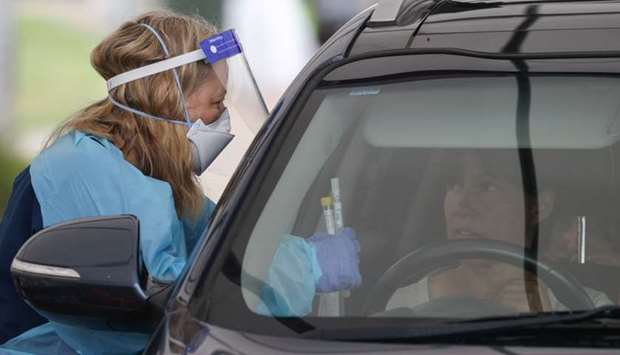* New UK strain is up to 70% more infectious
* UK strain detected in 2 travellers to Australia* Japan, India, S.Korea monitoring situation
* Thailand ramps up testing, Sydney cancels some domestic flights
Australia said on Monday it had detected cases of the new virulent coronavirus strain identified in the United Kingdom, while Hong Kong said it would suspend Britain flights.
Two travellers from the United Kingdom to Australia's New South Wales state were found carrying the mutated variant of the virus that Britain has said could be up to 70% more infectious. Both are in quarantine, and the recent spike in infections in Sydney are not linked to this, authorities said.
The new strain has prompted Britain's European neighbours and several others including Canada and Iran to close their doors to travellers from the country.
Much is unknown about the strain, but experts said current vaccines should still be effective against it.
Asian nations including Japan and South Korea said they were monitoring the new strain even as they battle a spike in infections at home.
Hong Kong became the first city in the region to ban flights from Britain in a bid to curb already rising case numbers in the dense financial hub.
The Chinese special administrative region said on Monday that people arriving from Britain before Dec. 22 would have to quarantine for three weeks instead of two.
South Korea, which imposes a 14-day quarantine on everyone entering the country, said it was reviewing new measures for flights from Britain, and would test twice those coming in from there before they were released from quarantine.
New cases climbed to over 1,000 a day in South Korea several times last week. It reported on Sunday an outbreak in a Seoul prison where 188 inmates and staff were infected.
The country said on Monday Seoul will ban gatherings of more than four people later this week and double hospital beds for critical COVID-19 cases by year end.
Taiwan, which also has a 14-day quarantine, said on Sunday there were no plans at present to stop flights from Britain.
An Indian government committee tasked with monitoring the pandemic met on Monday to discuss the new strain, but did not offer clarity on whether flights to Britain would be halted.
Britain is one of 23 countries that India shares an "air bubble" with. India's health minister said the country was prepared to deal with the new strain and that there was no need to panic.
Japan, where entry from Britain is already banned in principle, said it would keep in close touch with other countries as well as the World Health Organization to see how the new type of virus was spreading.
The new strain in Britain comes as cases have surged recently in several Asian countries that successfully contained the pandemic earlier. The spikes have prompted localised lockdowns in some countries and more aggressive testing.
Thailand said on Sunday it was testing tens of thousands of people, and extended curbs on movement, following its worst outbreak yet that began at a shrimp market in a province that is a centre of the seafood industry and home to thousands of migrant workers.
Thailand, the first country outside China to report COVID-19 cases, has so far reported just 60 deaths from the virus among its 70 million population. On Monday, the country confirmed 382 new infections, mostly migrant workers.
Thousands of workers in South East Asian countries such as Singapore and Malaysia have been infected in dormitories and factories, revealing often unsanitary living and working conditions even as overall numbers in these places have largely been contained.
Australia, where cases in Sydney have flared in recent days, on Monday cancelled dozens of domestic flights.
New South Wales, which reported 86 new local cases since Thursday, ordered more than a 250,000 people in Sydney's northern beaches area into a lockdown, and urged people who had visited venues where confirmed cases were found to get tested and self-isolate.
These cases are not part of the UK strain. Australian health authorities said a virus strain in northeastern Sydney matched a traveller from the United States, but how it got from the airport to the community was puzzling.

